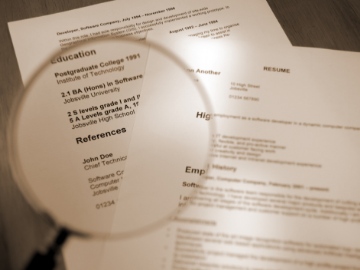What Should You Never Put on a Job Application

To impress an employer, a job application should be constructed with careful consideration. The only purpose of a job application is to land you an interview. To land an interview nowadays, it is vital to know the common errors that candidates make so that you don't make them yourself.
In this article, we will look at the things you should never put on a job application. Be aware of yourself, the job you are applying for, and what your job application should entail. Even the smallest alterations can make a big difference in your job hunt.
Everything in this article applies equally to job applications and resumes.
Common Errors
Employers may receive hundreds or thousands of applications for a single job posting. To stand out, you need to avoid the common errors and mistakes that other candidates make. Here are some examples of what you shouldn't do.
Use Meaningless Buzzwords
Buzzwords can help give a sentence some conviction, but they can also have the opposite effect. Words such as 'loyal, flexible, attention to detail, motivated, and multi-tasker' can all be useful, but to be effective they need to be backed up with evidence. Don't expect an employer to be blown away by your skills unless you can demonstrate that you truly have them. Focus on simply explaining your accomplishments.
Mentioning Irrelevant Information
Tailor your application to the job description and employer that you are applying for. Make sure that the skills you list are relevant and appropriate to the job in question. This means that you may have to exclude some previous experience or some hobbies and interests as the employer simply doesn't need to know about them.
Too Much (or Not Enough) Detail
Every sentence you write should have the purpose of informing an employer why you would be a great fit for the job. Don't waffle, but instead be concise and allow yourself enough room to include the right amount of detail. As mentioned before, your details should be relevant to the employer and job description.
Not Following Instructions
Many employers will give you a job application with a set of guidelines. It may sound obvious, but you MUST follow the application instructions that have been set by an employer. Read through application forms carefully and make sure you don't miss out on any documents or instructions that have been given to you.
Poor Spelling and Grammar
If your writing is sloppy, an employer will take one look at your job application and disregard you immediately. Tools such as Grammarly are fantastic for fixing any spelling or grammar errors that may pop up in your writing. It is also worth having a buddy read through your application, to check that your writing flows nicely.
Including Outdated Elements
Job applications have evolved somewhat in years gone by. There is no need to include a resume objective as that does nothing to demonstrate your skills and experience. Research beforehand the standard of application that an employer or industry will expect in the modern day to know what you should avoid including.
Highlighting Responsibilities
Job responsibilities can be assumed by an employer from the job title that you have provided. What a recruiter is really interested in, is your accomplishments in the role. In your job application, list your achievements, back them up with evidence, and prove that you are fit for the job.
Take Your Time
When completing resumes, cover letters, and job application forms, you will need to focus and give them your full attention. Assign a large chunk of time in your job search to writing and editing these documents. Identify any mistakes that you have made or sections that need more detail to give your application the punch it needs.
Once you have understood what you shouldn't include, it is crucial to know what you should include in your job application. Click here to find out more.


